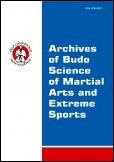2023, Volume 19, Issue 1
Effect of different sports on young athlete's posture swimmers and cyclists
Jelena Solovjova1, Behnam Boobani1, Juris Grants1, German Jakubovskis1, Ilze Avotina1, Zbigniew Obmiński2, Artur Litwiniuk3
1Latvian Academy of Sport Education, Riga, Latvia
2Research Institute, Institute of Sport-National Research Institute, Warsaw, Poland
3Jozef Pilsudski University of Physical Education in Warsaw, Faculty of Physical Education and Health, Biala Podlaska, Poland
Author for correspondence: Artur Litwiniuk; Jozef Pilsudski University of Physical Education in Warsaw, Faculty of Physical Education and Health, Biala Podlaska, Poland
Full text
Abstract
Background & Study Aim: In each sports discipline morphological characteristics, elements of technical, tactical, and psychological preparation can be distinguished whose high level may affect sports results. The aim of this study is knowledge about the express diagnostic program and the possibility of detecting changes in musculoskeletal posture in young athletes practicing various sports disciplines.
Material & Methods: The participants were 38 athletes from sports clubs in Riga, Latvia, swimmers (n = 19), and cyclists (n = 19) aged 14-15 years old with experience in National competitions. Body posture was assessed once before the training for visual diagnostics and muscular functional testing. A diagnostic program was developed from these methods, which included measuring the changes of 8 sagittal points from the vertical plane and functional testing of 8 muscle groups. The analyses were conducted using IBM SPSS version 26. The Shapiro-Wilk test, an independent t-test and the Mann-Whitney U test were used to analyse the data.
Results: The outdoor recreation activity (walking in nature) did not significantly affect the component of mental toughness (confidence t(11) = 0.451 as the p-value 0.837 >0.05, for constancy t(11) = −0.233; as the p-value 0.820 >0.05 and control t(11) = 0.117; as the p-value 0.909 >0.05) at the 5% level.
Conclusions: It can be concluded that each sport leads to postural changes in athletes due to specific functional muscle changes, as the results highlighted changes in both groups. Early postural changes in young athletes can be identified by applying express diagnostics. Early detection should lead to the prevention of injury.
Key words: body posture, innovative agonology, training loads





